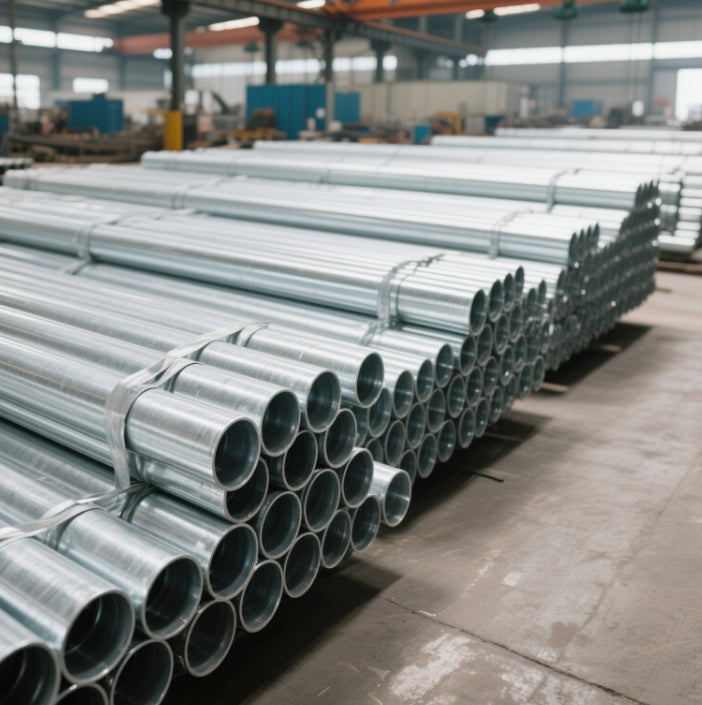StockSteel
Low-MOQ galvanized pipe fittings | Flexible Order Quantities
Low-MOQ galvanized pipe fittings | Flexible Order Quantities
Couldn't load pickup availability
Product Detail Page: Low-MOQ Galvanized Pipe Fittings | Flexible Order Quantities
Specifications & Technical Data
| Attribute | Details |
|---|---|
| Material | Carbon Steel (Q195, Q215, Q235, Q345) with Hot-Dip Galvanized Coating (Zinc: 40–275 g/m²) |
| Standards | ASTM A53, ASTM A500, JIS G3466, EN 10219, GB/T 3091, DIN 2440 |
| Diameter Range | 10–610 mm (Round), 10×10–1000×1000 mm (Square/Rectangular) |
| Wall Thickness | 0.3–30 mm |
| Length | 2–12 m (Standard), Customizable |
| Surface Treatment | Pre-galvanized or Hot-Dip Galvanized; Optional PVC Coating |
| Ends | Plain, Threaded, Grooved, Bevelled |
| Pressure Rating | 3–5 MPa (Dependent on Wall Thickness) |
| MOQ | 5 Tons (Standard Sizes), Flexible for Custom Orders |
Mechanical Properties
Tensile Strength
Galvanized steel pipes exhibit exceptional tensile strength, ranging from 315–630 MPa, depending on the steel grade. For example:
- Q195: 315–430 MPa
- Q345: 470–630 MPa
This ensures resistance to deformation under heavy loads, making them ideal for structural applications like building frameworks and industrial supports.
Bend Strength
With a yield strength of 195–345 MPa, our pipes maintain structural integrity even under bending stress. The galvanized layer further enhances fatigue resistance, critical for applications involving vibrations (e.g., machinery, HVAC systems) .
Identification & Marking
Pipes are labeled with:
- Laser Etching/Stamping: Includes grade (e.g., Q235), thickness, and standard (e.g., ASTM A53).
- Color Coding: Per ISO 3864 standards (e.g., blue for water, yellow for gas) .
- Certification Marks: Third-party inspection stamps (e.g., SGS, BV) for quality assurance.
Weight Calculation
The weight of galvanized pipes can be calculated using:
Where:
- OD: Outer Diameter (mm)
- WT: Wall Thickness (mm)
For example, a 50 mm OD pipe with 2.5 mm wall thickness weighs:
Online tools like GI Pipe Weight Calculator simplify this process.
Why Stainless Steel Rusts?
While stainless steel is corrosion-resistant, rust can occur due to:
- Chloride Exposure: Salt or chemicals damage the chromium oxide layer .
- Mechanical Damage: Scratches or abrasions expose the base metal.
- Improper Welding: Incomplete passivation post-welding leaves vulnerable spots.
- Low-Quality Alloys: Grades like 201/202 lack sufficient nickel, reducing corrosion resistance.
Regular maintenance and selecting high-grade stainless steel (e.g., 304/316) mitigate these risks.
Applications & Advantages Over Alternatives
- Cost Efficiency: Replacing galvanized pipes with PVC might save upfront costs (~3/ft), but galvanized steel offers 2–3x longer lifespan .
- Durability: Welded galvanized pipe joints withstand pressures up to 5 MPa, outperforming PVC in high-temperature environments .
- Ease of Installation: Threading galvanized pipe is straightforward with standard tools, unlike complex PVC solvent welding .
Why Choose Our Stainless Steel Products?
- Superior Corrosion Resistance: Electro-polished surfaces and chromium-rich alloys ensure decades of rust-free performance .
- Customization: Tailored dimensions, coatings (e.g., epoxy, PVC), and threading/grooving services.
- Certified Quality: ISO 9001, CE, and LR certifications with third-party inspections (SGS/BV) .
- Eco-Friendly: 100% recyclable with low carbon footprint .
- Global Logistics: Fast shipping from Tianjin/Qingdao ports with flexible MOQs .

